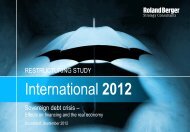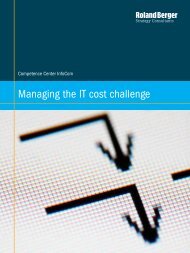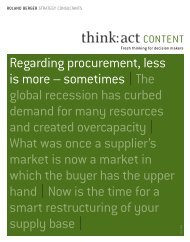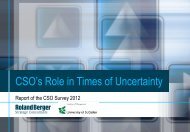issue 1 - Roland Berger
issue 1 - Roland Berger
issue 1 - Roland Berger
Create successful ePaper yourself
Turn your PDF publications into a flip-book with our unique Google optimized e-Paper software.
DOSSIER #01 Interview<br />
are either experiencing or facing the possibility of<br />
ongoing recession. Other states have had to deal<br />
with—or are now dealing with—unforeseen events<br />
that have led to their running up a budgetary deficit<br />
within a very short period. In this situation, it’s not<br />
enough simply to insist on the terms of the treaty.<br />
We need to find ways and means for our member<br />
countries to lift themselves out of these crises by<br />
themselves. The consensus is that the key parameters<br />
of the stability pact will not be altered. However,<br />
we must find new instruments that will help us react<br />
more flexibly to the economic difficulties of any<br />
member state<br />
»We must find new<br />
instruments that will help<br />
us react more flexibly to<br />
the economic difficulties<br />
of any member state.«<br />
The stability pact has an important function. It is<br />
an EU directive, making it a mandatory reference<br />
parameter for the national budgets of the member<br />
states. Among its fixed requirements are a maximum<br />
deficit of 3 percent and a maximum public debt<br />
of 60 percent—with both figures calculated as a<br />
share of GDP. But we must also firmly bear in mind<br />
what the initial situation was when this stability pact<br />
was concluded. Only then can we design a monetary<br />
and economic policy that is realistic both for today<br />
and for the future. Now that the EU has enlarged<br />
from 15 to 25 countries, this consideration is becoming<br />
even more important.<br />
When you talk about the initial situation, do you<br />
mean the Maastricht Treaty of 1993?<br />
Yes, exactly. Back then, a little over a decade ago,<br />
there were only 12 member states. At that time a<br />
growth rate of 3 percent didn’t seem unduly optimistic.<br />
But since then we have had to face up to<br />
some additional facts, such as that many countries<br />
This sounds almost too good to be true: The Commission<br />
is displaying leniency and understanding, even<br />
though many suspect member states may have<br />
been presenting false statistics for years to gain the<br />
financial benefits of European Union membership.<br />
That’s not the case at all. We at the Commission will<br />
never get to the point where we overlook wrongdoing<br />
with a wink and a smile, and politely ask the culprits<br />
to do better in future. No, all the facts that have<br />
recently come to light indicate just one thing: Every<br />
country has its own individual history when it comes<br />
to financial policy. This is why for me it is a question<br />
of monitoring and analyzing all these complex circumstances,<br />
so that we can pursue a sustainable<br />
financial policy. After all, how did things look in<br />
Germany back when its economy was still going<br />
strong? Did anyone seriously entertain the notion<br />
that lean years might be just around the corner? No,<br />
of course they didn’t. And that is an example of why<br />
self-criticism is the principle means of immunization<br />
against repeating past mistakes.<br />
How does the Commission intend to ensure that<br />
there will be no future violations of the stability pact?<br />
The precautionary principle is not simply a romantic<br />
relic from the era of the agricultural subsistence<br />
economy. For the member states it is the only possible<br />
means of reacting to economic fluctuations without<br />
outside help and of maintaining a balanced<br />
budget regardless of the perturbations of the economic<br />
cycle. The Commission will be steadfast in<br />
pushing for the implementation of this principle.<br />
36<br />
think: act
















